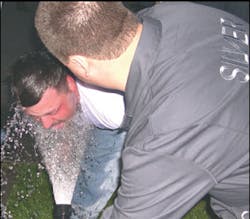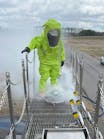Over the past few years, first responders throughout the world have developed innovative ways of training and preparing to deal with mass-casualty events that require mass decontamination. While the fire service has been preparing to respond to weapons of mass destruction (WMD), the law enforcement community has been training with a popular chemical agent of its own - OC pepper spray.
The active ingredient in pepper spray is oleoresin capsicum (OC), which is produced naturally in hot peppers. People exposed to OC experience a burning sensation, particularly in the eyes, nose, mouth and throat. Severe pain and tearing may result in temporary blindness, and breathing may become difficult as the OC affects the respiratory system. Effects of pepper spray mimic many of the symptoms of chemical agents, such as nerve and choking agents, but without significant risk of death or permanent injury.
Not only is pepper spray a law enforcement tool, but it is also readily available to the public for self defense and is commonly carried by utility and postal workers to control dogs and other animals. Many fire companies have responded to incidents involving pepper spray in schools, shopping malls and restaurants. Some of these incidents have involved the legitimate use of this product, while others have been the result of malicious or accidental releases. In any case, innocent bystanders have often been affected.
Pepper spray is not toxic, but it is a strong irritant used to control unruly individuals and crowds. Last year, its use turned deadly in Chicago, when panic ensued after security guards used the substance to break up a fight in a crowded nightclub. Twenty-one people died of crushing and suffocation as over 1,500 patrons rushed for the stairs and exit doors. Although manufacturers of pepper spray market it as "less than lethal," the tragedy in Chicago illustrates how lethal the product can be if used improperly.
Police officers in many jurisdictions are required to be exposed to pepper spray in training before being permitted to carry it. The objective is to develop an understanding of the effects and limitations of OC, better preparing officers to deal with suspects that have been sprayed. Also, officers are better able to protect themselves if they are ever contaminated with OC.
The Allegheny County, PA, Sheriff's Department has partnered with local firefighters and hazardous materials technicians to provide training that has proven beneficial to all participants. While the police recruits learn from personal contact with OC, firefighters benefit from the opportunity to perform decontamination on live "victims" exhibiting real symptoms.
One of the objectives of this training is to have the police recruits, while playing the role of victims, perform self-decontamination under the direction of firefighters. In a mass-decontamination event, limited resources of fire and hazmat personnel may require victims to decontaminate themselves and each other under the supervision of firefighters.
Another objective is to encourage responders to utilize proper protective equipment and avoid becoming contaminated themselves. It is easy to become cross contaminated with OC while working with people who have been exposed to pepper spray. It is also easy to become contaminated with biological pathogens, as pepper spray causes its victims to secrete bodily fluids from the eyes, nose and mouth. Respiratory protection is recommended, along with full protective clothing. Although structural firefighting gear provides limited protection against exposure to OC, disposable gloves and coveralls may be preferred.
Manufacturers of OC pepper spray consider it to be a food product derivative rather than a contaminant. Therefore, they emphasize that victims should be "cleansed" rather than "decontaminated." For our purposes, the terms are the same. Cleansing usually involves the use of water, and may be improved with a mild soap.
Various commercial cleansing agents containing water, soap, tea and/or herbal extracts are available specifically for OC pepper spray, and are intended for law enforcement officers to use on suspects who have been sprayed with OC. These products are generally intended for individual victims and may be used when no water is available.
In Allegheny County, emergency responders have experimented with a number of common cleansing agents, and found that baby shampoo works well. Various liquid soaps and dishwashing detergents also work well, but are not intended for eyes. Baby shampoo is formulated to be gentle to the eyes. Under no circumstances should chlorine bleach or harsh chemicals be used on victims.
Before cleansing begins, pepper spray victims are directed to remove contaminated clothing and contact lenses. When training with pepper spray, contact lenses should not be worn. Victims should also dab any excess product from their skin with a clean, dry cloth. Next, victims are asked to hold out their hands with their palms up to receive a generous amount of full-strength shampoo. Rather than mixing shampoo with water, it works very well straight out of the bottle. Victims are instructed to rub the shampoo into affected skin and eyes for about 30 seconds.
Water is then used to remove the shampoo, along with any remaining OC. Cool water should be applied gently from small hoses. Garden hoses and nozzles work well. Buckets and tubs of water should be avoided because they retain OC and will re-expose victims. Remember that pepper spray is a food derivative and may be washed away without causing environmental harm. Confinement of runoff products should be a lesser priority when victims are involved - life safety comes first.
Once the shampoo is thoroughly rinsed away, victims need another clean cloth to dry themselves off. Victims should then be exposed to fresh air in order for any remaining pepper spray to dissipate. Although victims may ask for more water to help relieve the pain, this should be avoided. Once a victim's face is dry, the pain will go away quickly as the OC evaporates. More water only delays this process.
After victims are thoroughly cleansed and comfortable, they are reviewed by medical personnel. Once released, they are directed to go home and take a shower. Never allow victims to operate a vehicle unless they are able to do so safely. Remind them that the pain may flare up again once in the shower, as water re-activates any remaining OC. Also, recommend that they lean forward while showering, so that the remaining OC does not run down and affect the crotch area - this can be very painful!
Toxic chemicals, including chemical warfare agents, are real threats and must be understood by all emergency responders. Realistic training is an integral part of chemical emergency preparedness.
Firefighters and hazmat technicians can benefit from training with law enforcement officers, and OC pepper spray offers a unique opportunity in which "victims" are "contaminated" for training purposes. The symptoms are real, and so are the hazards. The lessons learned from training scenarios may prove to be beneficial in real-life chemical emergencies.
Steve McConachie is a firefighter at Laurel Gardens Volunteer Fire Company in Ross Township, PA. He is vice president of the Pennsylvania Association of Hazardous Materials Technicians and a former commander of the Allegheny County Silver Team, a state-certified hazardous materials response team. He can be reached at [email protected].






